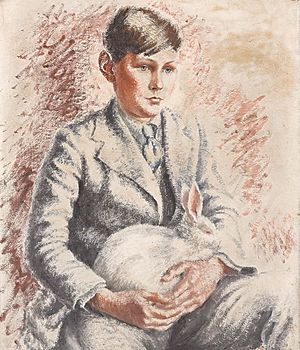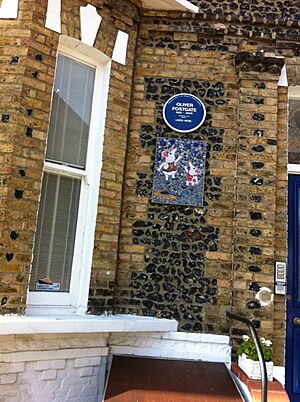Oliver Postgate facts for kids
Quick facts for kids
Oliver Postgate
|
|
|---|---|

Oliver Postgate in 1934, by Stella Bowen
|
|
| Born |
Richard Oliver Postgate
12 April 1925 |
| Died | 8 December 2008 (aged 83) Broadstairs, Kent, England
|
| Occupation | Animator, puppeteer, writer |
| Spouse(s) |
Prudence Myers
(m. 1957; died 1982) |
| Partner(s) | Naomi Linnell (1985–2008) |
| Children | 3, including Daniel |
| Parent(s) | Raymond Postgate Daisy Lansbury |
| Family | Postgate family |
Richard Oliver Postgate (born April 12, 1925 – died December 8, 2008) was an English animator, puppeteer, and writer. He created and wrote some of Britain's most loved children's TV shows.
Shows like Bagpuss, Pingwings, Noggin the Nog, Ivor the Engine, Clangers, and Pogles' Wood were all made by Smallfilms. This was a company he started with his friend, artist, and puppet maker Peter Firmin. These shows were first shown on TV from the 1950s to the 1980s. In 1999, a BBC poll voted Bagpuss the most popular children's TV show ever.
Contents
Early Life and Family
Oliver Postgate was born in Hendon, England. His father, Raymond Postgate, was a journalist and writer. His mother was Daisy Lansbury.
Oliver was the cousin of the famous actress Angela Lansbury. His grandfather, George Lansbury, was an important politician in the Labour Party. Oliver also had a brother, John Postgate, who was a microbiologist.
School Days
Oliver went to several schools. He studied at Woodstock School and Woodhouse Secondary School in London. Later, he attended Dartington Hall School, which was a special private boarding school in Devon.
Life and Career Journey
Oliver joined the Home Guard in 1942 while studying at the Kingston School of Art. When he was old enough for military service during World War II in 1943, he chose not to join the army. He believed it was wrong to fight, just like his father had in World War I.
He was sent to prison for a short time because of this choice. After that, he was allowed to work on farms or do social service instead. He worked on farms until the war ended. Then, he went to Germany to help with social relief work for the Red Cross.
Starting His Career
After returning to the UK in 1948, Oliver studied at the London Academy of Music and Dramatic Art. However, he tried many different jobs and struggled to find what he truly wanted to do.
In 1957, he became a stage manager for a TV company called Associated-Rediffusion. He worked on children's shows and felt he could make better ones, even with small budgets. Oliver wrote a story called Alexander the Mouse. It was about a mouse who was born to be king.
He asked Peter Firmin, an art teacher, to create the backgrounds for the show. They used a special magnetic system to make the characters move. Oliver and Peter made about 26 of these shows live on TV.
After Alexander the Mouse was a success, Oliver got a deal to make his next series on film. He built a stop motion animation table in his bedroom. He wrote a Chinese story called The Journey of Master Ho. This show was made for deaf children, so it didn't need a soundtrack, which saved money.
Creating Smallfilms
Oliver and Peter Firmin decided to start their own company. They called it Smallfilms. They set up their business in an old cowshed at Peter's home in Blean, near Canterbury, Kent.
At Smallfilms, Oliver usually came up with the ideas and wrote the scripts. Peter created the artwork and built the models. Oliver also did the stop motion filming and many of the voices. This way, Smallfilms could make two minutes of film each day. This was much faster than other animation studios. Oliver's unique voice became well-known to many children.
They began in 1959 with Ivor the Engine. This show was for ITV and was about a Welsh steam locomotive who wanted to sing in a choir. The idea came from Oliver's wartime experience with a Welsh fireman. Later, Ivor the Engine was remade in colour for the BBC.
Next, they made Noggin the Nog for the BBC. This show helped Smallfilms become a trusted company for children's entertainment. At that time, there were only two TV channels in the UK.
Other Projects
In the 1970s and 1980s, Oliver was involved in the anti-nuclear campaign. He gave talks and wrote several booklets about it.
In 1986, Oliver worked with historian Naomi Linnell. He painted a very long picture, about 50 feet (15 meters), for a book. The painting showed the life and death of Thomas Becket. This artwork is now kept in the Royal Museum and Art Gallery in Canterbury. In 1990, he painted a similar work about Christopher Columbus.
Oliver also narrated a six-part comedy series for BBC Radio 4 called Elastic Planet in 1995. In his later years, he wrote for the New Statesman magazine online. In 2003, his voice was heard again as the narrator for Alchemists of Sound. This was a TV show about the BBC Radiophonic Workshop.
In 1987, the University of Kent gave Oliver an honorary degree. He joked that the degree was really for Bagpuss, who was later shown wearing academic clothes.
Personal Life
Oliver Postgate married Prudence "Prue" Myers in 1957. He became a stepfather to her three children. In 1959, Oliver and Prue had twins, Stephen and Simon. They had another son, Daniel Postgate, in 1964. Prue sadly passed away from cancer in 1982.
Naomi Linnell was Oliver's partner for the last 23 years of his life.
His autobiography, Seeing Things, was published in 2000. After Oliver died in 2008, his son Daniel added an afterword to the book.
Later Years and Legacy
Oliver Postgate died on December 8, 2008, at the age of 83. He passed away in a nursing home near his home in Broadstairs, Kent.
After his death, many people recognized his huge influence on British culture. There was a lot of affection for how his work had touched so many lives. His work was widely discussed in the UK media, and many tributes were paid to him online. Charlie Brooker dedicated a part of his Screenwipe show to Oliver Postgate. He talked about how Oliver's work influenced his own childhood.
 | Roy Wilkins |
 | John Lewis |
 | Linda Carol Brown |


